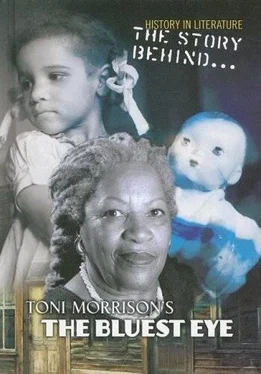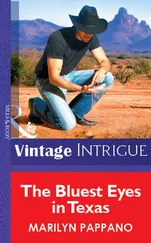"Outside."
"Drink that water right here!"
"I ain't gonna break nothing."
"You don't know what you gonna do."
"Yes, ma'am. I do.
Lemme take it out. I won't spill none."
"You bed' not." I got to the porch and stood there with the Mason jar of water. Pecola was crying. "What you crying for? Does it hurt?" She shook her head.
"Then stop slinging snot." Frieda opened the back door. She had something tucked in her blouse. She looked at me in amazement and pointed to the jar. "What's that supposed to do?"
"You told me.
You said get some water."
"Not a little old jar full. Lots of water. To scrub the steps with, dumbbell!"
"How was I supposed to know?"
"Yeah. How was you. Come on." She pulled Pecola up by the arm. "Let's go back here." They headed for the side of the house where the bushes were thick.
"Hey. What about me? I want to go."
"Shut uuuup," Frieda stage-whispered. "Mama will hear you. You wash the steps." They disappeared around the corner of the house. I was going to miss something. Again. Here was something important, and I had to stay behind and not see any of it. I poured the water on the steps, sloshed it with my shoe, and ran to join them. Frieda was on her knees; a white rectangle of cotton was near her on the ground.
She was pulling Pecola's pants off. "Come on. Step out of them."
She managed to get the soiled pants down and flung them at me.
"Here."
"What am I supposed to do with these?"
"Bury them, moron." Frieda told Pecola to hold the cotton thing between her legs. "How she gonna walk like that?" I asked. Frieda didn't answer. Instead she took two safety pins from the hem of her skirt and began to pin the ends of the napkin to Pecola's dress.
I picked up the pants with two fingers and looked about for something to dig a hole with. A rustling noise in the bushes startled me, and turning toward it, I saw a pair of fascinated eyes in a dough-white face. Rosemary was watching us. I grabbed for her face and succeeded in scratching her nose. She screamed and jumped back. "Mrs. MacTeer! Mrs. MacTeer!" Rosemary hollered.
"Frieda and Claudia are out here playing nasty! Mrs. MacTeer!"
Mama opened the window and looked down at us. "What?"
"They're playing nasty, Mrs. MacTeer. Look. And Claudia hit me 'cause I seen them!" Mama slammed the window shut and came running out the back door. "What you all doing? Oh. Uh-huh.
Uh-huh. Playing nasty, huh?" She reached into the bushes and pulled off a switch. "I'd rather raise pigs than some nasty girls. Least I can slaughter them!" We began to shriek. "No, Mama. No, ma'am. We wasn't! She's a liar! No, ma'am, Mama! No, ma'am, Mama!" Mama grabbed Frieda by the shoulder, turned her around, and gave her three or four stinging cuts on her legs.
"Gonna be nasty, huh? Naw you ain't!" Frieda was destroyed.
Whippings wounded and insulted her. Mama looked at Pecola. "You too!" she said. "Child of mine or not!" She grabbed Pecola and spun her around. The safety pin snapped open on one end of the napkin, and Mama saw it fall from under her dress. The switch hovered in the air while Mama blinked. "What the devil is going on here?" Frieda was sobbing. I, next in line, began to explain.
"She was bleeding. We was just trying to stop the blood!" Mama looked at Frieda for verification. Frieda nodded. "She's ministratin'. We was just helping." Mama released Pecola and stood looking at her. Then she pulled both of them toward her, their heads against her stomach. Her eyes were sorry. "All right, all right. Now, stop crying. I didn't know. Come on, now. Get on in the house. Go on home, Rosemary. The show is over." We trooped in, Frieda sobbing quietly, Pecola carrying a white tail, me carrying the little-girl-gone-to-woman pants. Mama led us to the bathroom. She prodded Pecola inside, and taking the underwear from me, told us to stay out. We could hear water running into the bathtub. "You think she's going to drown her?"
"Oh, Claudia. You so dumb. She's just going to wash her clothes and all."
"Should we beat up Rosemary?"
"No. Leave her alone."
The water gushed, and over its gushing we could hear the music of my mother's laughter.
That night, in bed, the three of us lay still. We were full of awe and respect for Pecola. Lying next to a real person who was really ministratin' was somehow sacred. She was different from us now-grown-up-like. She, herself, felt the distance, but refused to lord it over us. After a long while she spoke very softly. "Is it true that I can have a baby now?"
"Sure," said Frieda drowsily. "Sure you can."
"But… how?" Her voice was hollow with wonder. "Oh," said Frieda, "somebody has to love you."
"Oh."
There was a long pause in which Pecola and I thought this over.
It would involve, I supposed, "my man," who, before leaving me, would love me. But there weren't any babies in the songs my mother sang. Maybe that's why the women were sad: the men left before they could make a baby. Then Pecola asked a question that had never entered my mind. "How do you do that? I mean, how do you get somebody to love you?" But Frieda was asleep. And I didn't know.
HEREISTHEHOUSEITISGREENANDWHITEITHASAREDDO ORITISVERYPRETTYITISVERYPRETTYPRETTYPRETTYP There is an abandoned store on the southeast corner of Broadway and Thirty-fifth Street in Lorain, Ohio. It does not recede into its background of leaden sky, nor harmonize with the gray frame houses and black telephone poles around it. Rather, it foists itself on the eye of the passerby in a manner that is both irritating and melancholy. Visitors who drive to this tiny town wonder why it has not been torn down, while pedestrians, who are residents of the neighborhood, simply look away when they pass it. At one time, when the building housed a pizza parlor, people saw only slow-footed teen-aged boys huddled about the corner.
These young boys met there to feel their groins, smoke cigarettes, and plan mild outrages. The smoke from their cigarettes they inhaled deeply, forcing it to fill their lungs, their hearts, their thighs, and keep at bay the shiveriness, the energy of their youth. They moved slowly, laughed slowly, but flicked the ashes from their cigarettes too quickly, too often, and exposed themselves, to those who were interested, as novices to the habit. But long before the sound of their lowing and the sight of their preening, the building was leased to a Hungarian baker, modestly famous for his brioche and poppy-seed rolls.
Earlier than that, there was a realestate office there, and even before that, some gypsies used it as a base of operations. The gypsy family gave the large plate-glass window as much distinction and character as it ever had. The girls of the family took turns sitting between yards of velvet draperies and Oriental rugs hanging at the windows. They looked out and occasionally smiled, or winked, or beckoned-only occasionally. Mostly they looked, their elaborate dresses, long-sleeved and long-skirted, hiding the nakedness that stood in their eyes.
So fluid has the population in that area been, that probably no one remembers longer, longer ago, before the time of the gypsies and the time of the teen-agers when the Breedloves lived there, nestled together in the storefront. Festering together in the debris of a realtor's whim. They slipped in and out of the box of peeling gray, making no stir in the neighborhood, no sound in the labor force, and no wave in the mayor's office. Each member of the family in his own cell of consciousness, each making his own patchwork quilt of reality-collecting fragments of experience here, pieces of information there. From the tiny impressions gleaned from one another, they created a sense of belonging and tried to make do with the way they found each other. The plan of the living quarters was as unimaginative as a first-generation Greek landlord could contrive it to be. The large "store" area was partitioned into two rooms by beaverboard planks that did not reach to the ceiling. There was a living room, which the family called the front room, and the bedroom, where all the living was done. In the front room were two sofas, an upright piano, and a tiny artificial Christmas tree which had been there, decorated and dust-laden, for two years. The bedroom had three beds: a narrow iron bed for Sammy, fourteen years old, another for Pecola, eleven years old, and a double bed for Cholly and Mrs.
Читать дальше











